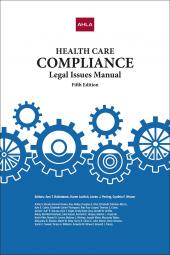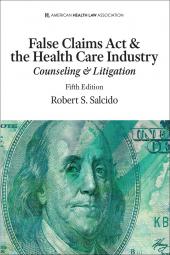AHLA Health Care Compliance Legal Issues Manual (AHLA Members)
In this reorganized, and expanded edition of AHLA's bestselling, Health Care Compliance Legal Issues Manual, readers will find strategies for addressing the full scope of legal issues critical to health care compliance. The Manual addresses important topics such as what a compliance program is, how to conduct internal investigations, audit basics, what to consider prior to deciding on repayments and disclosures, substantive overviews of the False Claims Act, the Stark and Anti-kickback laws, health information privacy and security, issues in life sciences entities, tax compliance, and many others.
Select a format
 International Order Inquiry
International Order Inquiry
Select subscription type
Terms & conditions
Subscribers receive the product(s) listed on the Order Form and any Updates made available during the annual subscription period. Shipping and handling fees are not included in the annual price.
Subscribers are advised of the number of Updates that were made to the particular publication the prior year. The number of Updates may vary due to developments in the law and other publishing issues, but subscribers may use this as a rough estimate of future shipments. Subscribers may call Customer Support at 800-833-9844 for additional information.
Subscribers may cancel this subscription by: calling Customer Support at 800-833-9844; emailing customer.support@lexisnexis.com; or returning the invoice marked "CANCEL".
If subscribers cancel within 30 days after the product is ordered or received and return the product at their expense, then they will receive a full credit of the price for the annual subscription.
If subscribers cancel between 31 and 60 days after the invoice date and return the product at their expense, then they will receive a 5/6th credit of the price for the annual subscription. No credit will be given for cancellations more than 60 days after the invoice date. To receive any credit, subscriber must return all product(s) shipped during the year at their expense within the applicable cancellation period listed above.
Subscribers receive the product(s) listed on the Order Form and any Updates made available during the annual subscription period. Shipping and handling fees are not included in the annual price.
Subscribers are advised of the number of Updates that were made to the particular publication the prior year. The number of Updates may vary due to developments in the law and other publishing issues, but subscribers may use this as a rough estimate of future shipments. Subscribers may call Customer Support at 800-833-9844 for additional information.
Subscribers may cancel this subscription by: calling Customer Support at 800-833-9844; emailing customer.support@lexisnexis.com; or returning the invoice marked 'CANCEL'.
If subscribers cancel within 30 days after the product is ordered or received and return the product at their expense, then they will receive a full credit of the price for the annual subscription.
If subscribers cancel between 31 and 60 days after the invoice date and return the product at their expense, then they will receive a 5/6th credit of the price for the annual subscription. No credit will be given for cancellations more than 60 days after the invoice date. To receive any credit, subscriber must return all product(s) shipped during the year at their expense within the applicable cancellation period listed above.
Product description
View a sample of this title using the ReadNow feature
If you are not an AHLA member and would like to purchase this book, click here.
Authored by experts with years of health care compliance experience, this new edition integrates changes in regulation, trends in enforcement, and the reasoning of the courts to help you navigate emerging and unsettled areas of compliance risk, such as self-disclosure obligations, risks associated with opioid use, and the impact of statistical sampling.
Highlights of this edition include:
- All new glossary of health care compliance terms, including key statutes, acronyms, governing agencies, and more
- Expanded civil monetary penalty and exclusion authorities under 2017 final rules
- Discussion of core elements of compliance programs for Medicare Advantage Plans and Part D Plans as established by federal regulations
- Expanded whistleblower protections under federal and state law, false claims based on lack of medical necessity, materiality after Escobar, and recent enforcement activity
- Expanded discussion of determinations of medical necessity, CMS review of medical necessity terminations, consequences, and appeals processes
- Recent health information privacy and security developments, including new guidance, risks associated with innovative technologies, and trends in Health Insurance Portability and Accountability Act (HIPAA) enforcement activity
EDITORS: Ann T. Hollenbeck, Karen Lovitch, Lester J. Perling, Cynthia F. Wisner
AUTHORS: Brooke Bennet Aziere, Amy Bailey, Douglas A. Blair, Elizabeth Callahan-Morris, Kyle E. Calvin, Elizabeth Carder-Thompson, Ritu Kaur Cooper, Thomas S. Crane, Gerald "Jud" E. DeLoss, Kyle Faget, Emily Black Grey, Gerald M. Griffith, Nancy Bonifant Halstead, Jake Harper, Kenneth E. Hooper, Gabriel L. Imperato, Kevin Kifer, Ronald H. Levine, Melissa L. Markey, Joseph Metro, Macauley Rybar, Alexandra "Allie" B. Shalom, Albert W. Shay, Harry R. Silver, E. John Steren, Drew Stevens, Sarah E. Swank, Teresa A. Williams, Amanda M. Wilwert, Howard J. Young
For full author bios, click here.
eBooks, CDs, downloadable content, and software purchases are noncancelable, nonrefundable and nonreturnable. Click here for more information about LexisNexis eBooks. The eBook versions of this title may feature links to Lexis+® service for further legal research options. A valid subscription to Lexis+ is required to access this content.
Published April, 2019.
Table of contents
Chapter 1 Glossary of Key Terms
Chapter 2 What Is a Compliance Program?
Chapter 3 OIG Model Compliance Guidance by Provider Type
Chapter 4 Background Checks and Excluded Persons
Chapter 5 Government Program Participation and CMS Billing Revocation Authority
Chapter 6 Corporate Transparency and Disclosure
Chapter 7 Regulatory Advice and Liability Issues
Chapter 8 What to Do When the Government Knocks
Chapter 9 Managing an Internal Investigation
Chapter 10 The Relationship between Enforcement and Compliance
Chapter 11 False Claims
Chapter 12 Repayments and Self-Disclosures
Chapter 13 Internal and External Audit Basics
Chapter 14 Medical Necessity, Claims, and Payment Processes
Chapter 15 Stark and Anti-Kickback Prohibitions
Chapter 16 EMTALA Compliance
Chapter 17 Health Care Civil Rights and Nondiscrimination Under Section 1557 of the Affordable Care Act
Chapter 18 Health Information Privacy and Security Laws
Chapter 19 Behavioral Health
Chapter 20 Research Compliance
Chapter 21 Antitrust Laws
Chapter 22 Drugs, Devices, and Life Sciences Entities
Chapter 23 Exempt Organizations and Other Tax Compliance Issues
Appendices
Index


